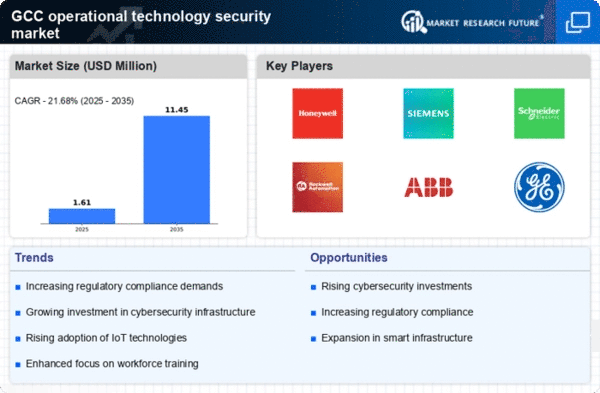Rising Cyber Threats
The operational technology-security market is experiencing heightened demand due to the increasing frequency and sophistication of cyber threats. In the GCC region, industries such as oil and gas, manufacturing, and utilities are particularly vulnerable to cyberattacks. Reports indicate that the number of cyber incidents targeting critical infrastructure has surged by over 30% in the past year. This alarming trend compels organizations to invest in robust security measures to protect their operational technology environments. As a result, the operational technology-security market is projected to grow significantly, with estimates suggesting a compound annual growth rate (CAGR) of around 15% over the next five years. Companies are prioritizing the implementation of advanced security protocols to safeguard their assets and ensure business continuity.
Technological Advancements
Technological advancements are significantly influencing the operational technology-security market. The integration of innovative technologies such as the Internet of Things (IoT), cloud computing, and big data analytics is transforming the way organizations approach security. In the GCC, industries are increasingly adopting IoT devices for operational efficiency, which simultaneously raises security concerns. As a result, there is a growing need for comprehensive security solutions that can address the vulnerabilities associated with these technologies. Market analysts suggest that the operational technology-security market could expand by 18% annually as organizations invest in next-generation security tools that leverage artificial intelligence and machine learning to detect and respond to threats in real-time. This trend indicates a shift towards proactive security measures in the operational technology landscape.
Focus on Compliance and Standards
The operational technology-security market is being driven by a heightened focus on compliance with industry standards and regulations. In the GCC, organizations are increasingly required to adhere to stringent cybersecurity frameworks, such as the NIST Cybersecurity Framework and ISO 27001. Compliance not only mitigates risks but also enhances the credibility of organizations in the eyes of stakeholders. As regulatory bodies enforce these standards, companies are compelled to invest in security solutions that align with compliance requirements. This trend is expected to propel the operational technology-security market, with estimates suggesting a growth rate of approximately 22% over the next few years. Organizations that prioritize compliance are likely to gain a competitive edge, further fueling market demand.
Government Initiatives and Support
Government initiatives in the GCC region are playing a pivotal role in shaping the operational technology-security market. Various national cybersecurity strategies have been introduced, aimed at enhancing the resilience of critical infrastructure against cyber threats. For instance, the UAE has launched the National Cybersecurity Strategy, which emphasizes the importance of securing operational technology systems. This governmental support is likely to drive investments in cybersecurity solutions, as organizations seek to comply with national regulations and standards. Furthermore, funding opportunities and incentives provided by governments are encouraging businesses to adopt advanced security technologies. The operational technology-security market is expected to benefit from these initiatives, with a projected increase in market size by approximately 20% over the next few years.
Increased Awareness of Cybersecurity Risks
There is a growing awareness of cybersecurity risks among organizations operating in the GCC, which is driving demand for the operational technology-security market. As businesses recognize the potential financial and reputational damage caused by cyber incidents, they are prioritizing investments in security solutions. Surveys indicate that over 70% of companies in the region consider cybersecurity a top priority, leading to increased budgets allocated for security measures. This heightened awareness is prompting organizations to conduct regular risk assessments and implement comprehensive security frameworks. Consequently, the operational technology-security market is likely to witness substantial growth, with projections indicating a market expansion of around 25% in the coming years as companies strive to enhance their security postures.
















